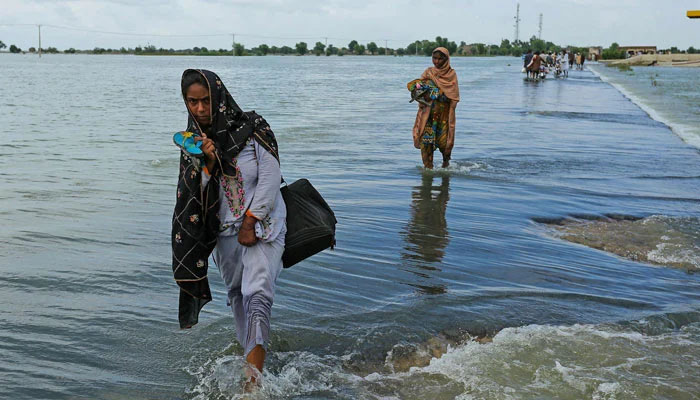0.65 million pregnant flood victims need maternal care: UNFPA
ISLAMABAD: About 6.4 million Pakistanis require humanitarian assistance after flash floods, while over half a million pregnant women are in dire need of maternal health services, and many others are vulnerable to violence, warned the UN sexual and reproductive health agency (UNFPA) on Wednesday.
“Almost 650,000 pregnant women in the flood-affected areas [of Pakistan] require maternal services for safe pregnancy and childbirth. Up to 73,000 women expected to deliver next month will need skilled birth attendants, newborn care, and support. In addition, many women and girls are at risk of gender-based violence as almost one million houses have been damaged,” the UNFPA said in a report.
The report said: “Among the 6.4 million Pakistanis who need assistance following the monsoon rains, floods, and landslides while over 1.6 million of them are women of childbearing age. The Pakistani government estimated that around 33 million people across the country were affected by the monsoon disaster, including an estimated 8.2 million women of reproductive age. The humanitarian situation is being compounded by severe impacts on infrastructure. More than 1,000 health facilities are either partially or fully damaged in Sindh, whereas 198 health facilities were damaged in Balochistan. The damage to roads and bridges has also compromised girls’ and women’s access to health facilities.”
UNFPA Pakistan representative Dr Bakhtior Kadirov said pregnancies and childbirth couldn’t wait for emergencies or natural disasters to be over. “This is when a woman and baby are vulnerable and need the most care. The UNFPA is on the ground, working with partners, to ensure that pregnant women and new mothers continue receiving life-saving services even under the most challenging conditions,” he said.
Dr Bakhtior said his UN agency would continue supporting health facilities with the equipment and human resources to be fully operational despite the challenging conditions. He said the UNFPA was scaling up its emergency response to provide life-saving reproductive health services and commodities, including dignity kits, for women and girls.
“We have so far procured 8,311 dignity kits, 7,411 newborn baby kits and 6,412 clean delivery kits for immediate delivery to Sindh, Balochistan, KP, and Punjab. The distribution of these kits has already started. UNFPA also provides life-saving reproductive health services across Pakistan, including referral of complicated cases during pregnancy and delivery,” he said.
The UN agency’s country head said efforts were also being made to prioritize gender-based violence prevention and response services, including medical and psycho-social support to survivors of that violence.
-
 Host Alan Cumming Thanks BAFTAs Audience For Patience After Tourette’s Disturbance
Host Alan Cumming Thanks BAFTAs Audience For Patience After Tourette’s Disturbance -
 Jennifer Garner Reveals Why Reunion With Judy Greer Makes Fans 'lose Their Minds'
Jennifer Garner Reveals Why Reunion With Judy Greer Makes Fans 'lose Their Minds' -
 Chris Hemsworth Makes Shocking Confession About His Kids' Reaction To His Fame
Chris Hemsworth Makes Shocking Confession About His Kids' Reaction To His Fame -
 Wiz Khalifa Reveals Unconventional Birthday Punch Tradition With Teenage Son In New Video
Wiz Khalifa Reveals Unconventional Birthday Punch Tradition With Teenage Son In New Video -
 BAFTAs 2026: Kerry Washington Makes Debut In Custom Prada Gown
BAFTAs 2026: Kerry Washington Makes Debut In Custom Prada Gown -
 Jennifer Lopez Gets Emotional As Twins Max And Emme Turn 18
Jennifer Lopez Gets Emotional As Twins Max And Emme Turn 18 -
 Andrew Mountbatten Windsor Blunders Are Result Of 'conspiracy Of Silence'
Andrew Mountbatten Windsor Blunders Are Result Of 'conspiracy Of Silence' -
 Keith Urban Fires Entire Management Team After Divorcing Nicole Kidman
Keith Urban Fires Entire Management Team After Divorcing Nicole Kidman -
 Kylie Jenner Marks Death Anniversary Of Hairstylist Jesus Guerrero With '222' Tribute
Kylie Jenner Marks Death Anniversary Of Hairstylist Jesus Guerrero With '222' Tribute -
 Daniel Radcliffe On How It's Like Seeing New Harry Potter Cast Years Later
Daniel Radcliffe On How It's Like Seeing New Harry Potter Cast Years Later -
 Andrew Portrait Makes Unexpected Debut At Louvre Museum Over Epstein Protest
Andrew Portrait Makes Unexpected Debut At Louvre Museum Over Epstein Protest -
 Italy: Skeleton Of Saint Francis Of Assisi’s Goes On Public Display For First Time After 800 Years
Italy: Skeleton Of Saint Francis Of Assisi’s Goes On Public Display For First Time After 800 Years -
 Hailey Bieber's Subtle Gesture For Eric Dane’s Family Revealed
Hailey Bieber's Subtle Gesture For Eric Dane’s Family Revealed -
 Moment Prince William 'broke Down' And 'apologised' To Kate Middleton
Moment Prince William 'broke Down' And 'apologised' To Kate Middleton -
 Paul Mescal And Gracie Abrams Stun Fans, Making Their Romance Public At 2026 BAFTA
Paul Mescal And Gracie Abrams Stun Fans, Making Their Romance Public At 2026 BAFTA -
 EU Rejects Any Rise In US Tariffs After Court Ruling, Says ‘a Deal Is A Deal’
EU Rejects Any Rise In US Tariffs After Court Ruling, Says ‘a Deal Is A Deal’




